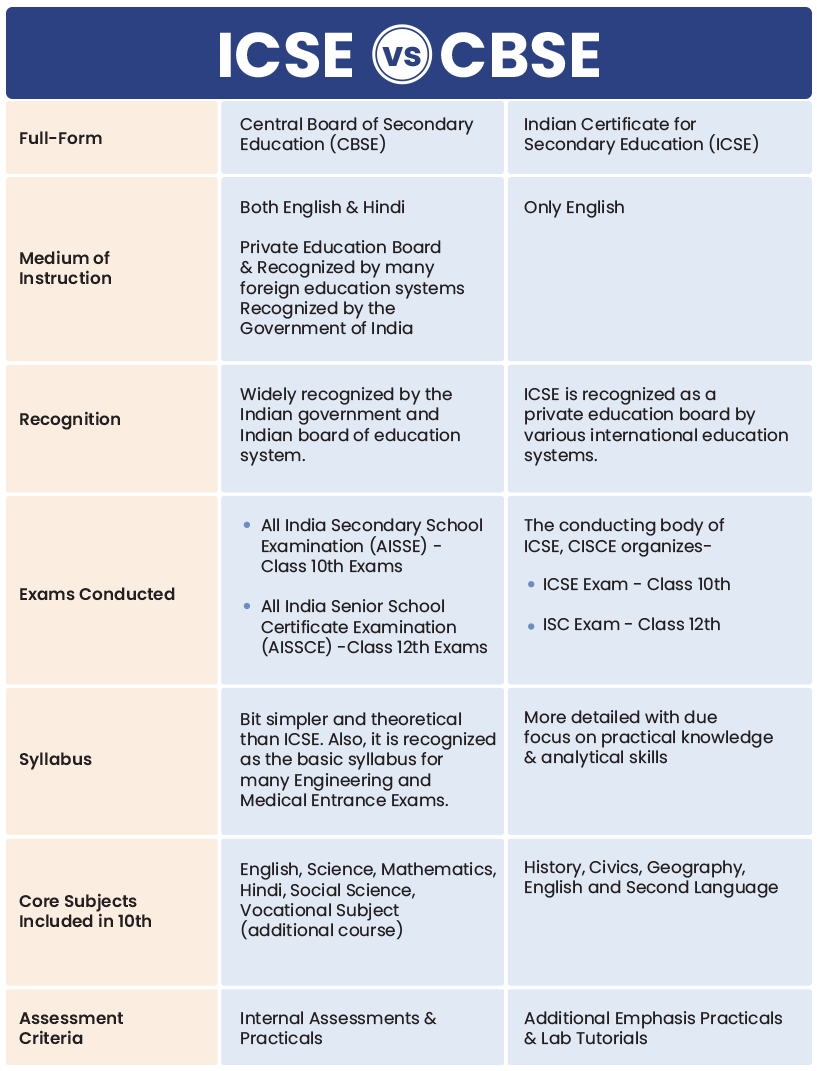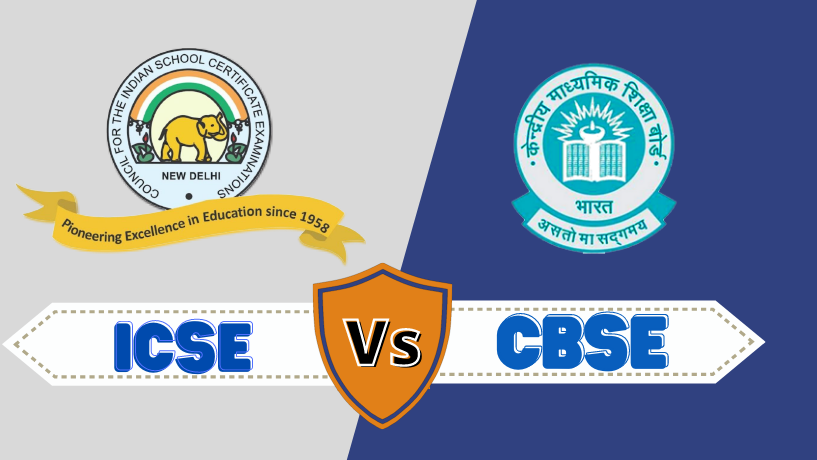CBSE vs ICSE: What Is the Difference Between CBSE and ICSE Board?
The board of education offered by a school is another quintessential parameter when selecting it. Amongst all the education boards, Central Board of Secondary Education (CBSE) and Indian Certificate of Secondary Education (ICSE) are majorly offered by the schools across India. Both the boards comprise varied distinct characteristics, yet focus on a common aim of imparting to students the best educational values. Let’s get started with the blog and take a look at what are the differences between CBSE vs ICSE along with their similarities.
CBSE Board
The full form of CBSE is the Central Board of Secondary Education. CBSE full form in Hindi is “केंद्रीय माध्यमिक शिक्षा बोर्ड”. Central Board of Secondary Education (CBSE) is considered one of the most preferred school boards for secondary and senior secondary levels of education. Approved by NCERT (National Council of Education and Research Training), CBSE offers a thorough combination of compulsory and additional subjects in its curriculum. As per the current Indian education system, CBSE conducts two sets of examinations – All India Secondary School Examination (AISSE) and All India Senior School Certificate Examination (AISSCE). Former is commonly known as class 10th board exams and later as class 12th board exams.
Overview of CBSE Board
- The CBSE follows the NCERT Curriculum.
- CBSE conducts the board examinations each year in the month of March, for classes Xth and XIIth.
- CBSE is responsible for conducting many of the major competitive exams such as JEE, AIPMT, NEET, and more.
- Both private and regular students are allowed to appear for the examinations conducted by CBSE.
- The CBSE ensures that there is only one question paper per subject across the nation.
- CBSE ensures education in both Hindi and English mediums and also provides on its website, reading material and workbooks in both languages.
- A large number of schools in the nation are affiliated with CBSE ensuring easy school transfers from one state to another.
- CBSE confirms a student-centered approach and provides interactive study material that supports analytical questioning.
ICSE Board
The full form of ICSE is the Indian Certificate of Secondary Education. ICSE full form in Hindi is “माध्यमिक शिक्षा के भारतीय प्रमाण पत्र”. Managed by the Council of Indian School Certificate Examination (CISCE), Indian Certificate of Secondary Education (ICSE) is another prestigious board of education offered by the schools. The Council for the Indian School Certificate Examination (CISCE) adopted the curriculum of Cambridge IGCSE that was prevalent during the British regime and was followed by the Anglo-Indian Board. When compared with CBSE, the syllabus of ICSE is considered to be intricate for all the classes. Owing to this, class 10th and 12th board examinations of ICSE are considered to be the toughest board exams.
Overview of ICSE Board
- The ICSE Examination is a school examination.
- The ICSE presumes a school course of a span of 10 years(Classes I-X).
- ICSE requires students to appear for exams in a total of six subjects and Socially Useful Productive Work.
- Subjects have been divided into 3 groups, where the subjects included in the first list are compulsory, while you can choose subjects of your choice from the second and third groups.
- ICSE releases its result by considering marks in 6 subjects, wherein the best 5 marks are chosen and English marks are mandatory to be considered as the sixth subject.
- Private Candidates are not allowed to appear for ICSE Examinations.
- ICSE follows an extensive syllabus and an application-based teaching methodology.
- ICSE provides a good standard of training to its students for Competitive Examinations.
- ICSE provides necessary support to special children that are handicapped in some way.
- ICSE has been recognized at both National and International levels.
What is the Difference Between CBSE and ICSE Board?
Let us consider the major differences between the CBSE and ICSE Boards:

- Pedagogy:
- The focus of CBSE is on giving its students a strong root or a firm base, which helps them in scoring high in various competitive exams like IIT JEE and NEET.
- ICSE stresses more on the lab and project assignments. 20% of marks are assigned based on the internal assessments.
- Syllabus:
- CBSE syllabus gives a push to all the theoretical concepts and the syllabus is less as compared to ICSE. The curriculum is divided into a set of modules and units and CBSE pre-decides the number of lectures it should take to cover the syllabus.
- ICSE stresses the detailed study of the subjects covered. It focuses on practical knowledge and concepts. ICSE aims to develop analytical skills in its students, which helps them in exams like TOEFL.
- Entrance Exams:
- CBSE is preferable if you want to appear for medical entrance exams because the syllabus in these examinations is based on CBSE 10+2 curriculum.
- ICSE prepares you for exams like TOEFL.
- Scholarships:
- CBSE offers multiple Talent Search exams and bestows various forms of scholarships to its students.
- The ICSE does not provide scholarships to its students, while the schools are allowed to do so by themselves.
- Subject Proficiency:
- The CBSE focuses on Science and Mathematics.
- ICSE gives priority to English as a subject. Other subjects of importance are Arts and Science.
- Marking Scheme: For class Xth,
- As per CBSE, the total marks would be given out of 100, where
- Each term will comprise 40 marks in theory board examinations and 10 marks per term will be awarded for Internal Assessment, adding to a total of 100 marks, with each of the two terms contributing 50 marks.
- Students will have to secure a minimum of 33% in each subject to pass.
- For ICSE, the marking scheme is divided as 80% marks will be taken from the external assessment and 20 % from the internal. The aggregate of both the marks will be taken as final.
- Board Transfers: Both are quite stiff in accepting students in classes X and XII.
- Transfers from the ICSE Board to CBSE are only possible, in case the student and his family has relocated to a new place. Otherwise, CBSE demands the student to study the IX and XI standards from CBSE itself.
- ICSE Board does not accept students from other boards in Classes Xth and XIIth. To be eligible to get admission in these classes, you must have studied with the ICSE in IX and XI standards respectively.
- Overall Personality:
- ICSE focuses on the complete growth and grooming of a child.
- CBSE increases your competitive caliber.
- Exam Pattern: As of 2022,
- For class X, the ICSE board Exams have been divided into two tiers.
- Tier-1 will only include MCQs.
- Tier-2 will comprise subjective as well as objective questions.
- The CBSE has divided the syllabus equally for the two terms.
- The first term will include case-based and assertion-reasoning type MCQs.
- Term 2 will comprise different formats including short and long answers, open-ended and, Case and Situation based questions.
- Easy Transfers:
- Numerous schools in India are affiliated with CBSE, which means it is easy for a child to change the school for another academic session.
- ICSE affiliations are less as compared to the CBSE.
Keeping all the above points in mind, and deciding on your specification and priorities for your child, Choose Wisely!
How to explore CBSE/ICSE Schools near you?
It is often difficult for parents to find a good school that is as per their requirements and the one that lies near to their locality. They often browse the internet with phrases like ‘CBSE/ICSE Schools near me’ but are not able to link to the right site. To solve this problem, the right solution is to go through UniApply.
UniApply is a common application platform that simplifies the entire school search process, application, and enrollment for both parents and students. It allows you to apply to multiple schools using a single form.
Visit UniApply – Allow your location, click on the header “Explore Schools” and you can put a filter on the Board like CBSE, ICSE and more, and it will display all the schools affiliated to that particular board.
Each school listed on UniApply carries all the relevant details like the address, courses, and classes going on, monthly fees, the student-faculty ratio, and more. You can easily shortlist the schools based on your requirement and compare them easily. This is the easiest way to apply in multiple schools using a single form.
Also Read:






